COVID-19 Member Flash Poll — Online Communication
The Association of Corporate Counsel conducted a fourth flash poll of our membership to learn more about how in-house counsel and legal departments are adapting to the effects caused by the COVID-19 pandemic.
This survey inquired about online communication and team collaboration, a highly relevant topic now that many corporate legal departments work remotely due to the recommended or enforced social distancing policies in many countries around the world. In our previous COVID-19 flash poll, 88 percent of ACC members surveyed indicated that they were working from home as of June 2020.
The results presented below include responses from 249 ACC members. Five thousand individuals were randomly selected and invited to participate. The survey opened on June 30 and closed on July 6.
Four in five participants indicated that their organization’s communication to staff since this new scenario started was about right. Thirteen percent believe that the organization has not communicated enough, and six percent, too much.
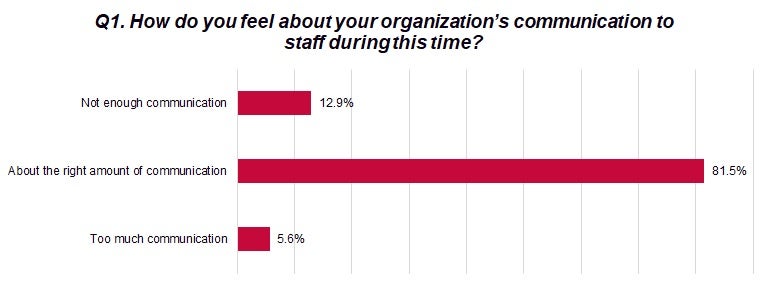
Nine in ten respondents indicated that their organization’s remote working policy has changed as a result of COVID-19. However, respondents are practically evenly divided when specifying whether the policy changes implemented will continue moving forward or whether they will be reversed — 47 percent of respondents point to the former scenario, and 44 percent to the latter.
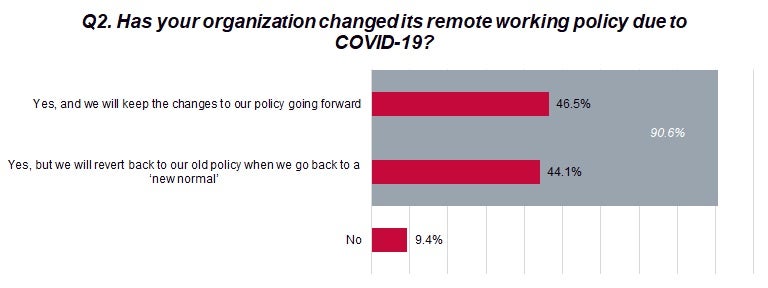
With a significant share of the workforce or even all staff working remotely, organizations may want to rethink whether their office space needs will change in the next few months. Forty-three percent of surveyed ACC members reported that this is a debate that is taking place in their organization: 31 percent of respondents believe that, moving forward, less office space will be needed; nine percent indicated that the organization is considering using flexible co-working spaces; and two percent responded that the discussion is about whether more office space will actually be needed.
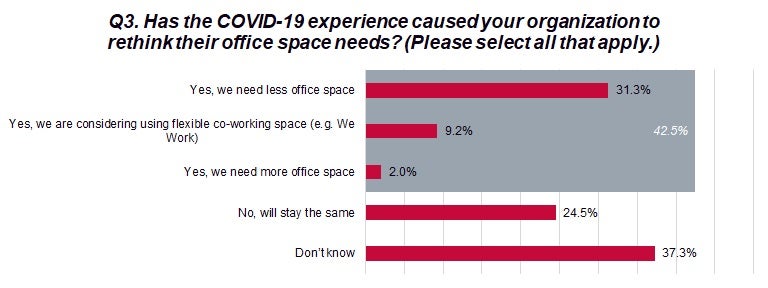
One in four surveyed members shared that their organization is not anticipating any changes in their office space needs for now, and 37 percent of in-house counsel admitted that they do not know what their organizations' plans may be at the moment regarding office space needs in the future.
With the transition to working from home on a long-term basis, in-house counsel may face challenges to adapt their new home office space to make it as functional as the one at work. Eighty-three percent of respondents reported that their employer provided some office or technology equipment to facilitate the transition to teleworking.
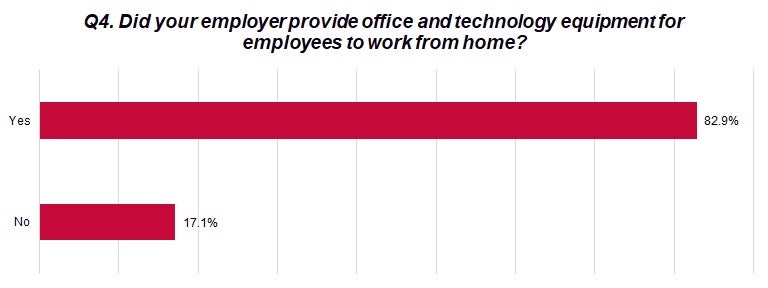
Almost all in-house counsel surveyed (93 percent) indicated that their organization provided a computer or a laptop. A solid majority also received a screen monitor (63 percent), and a mouse and/or keyboard (60 percent).
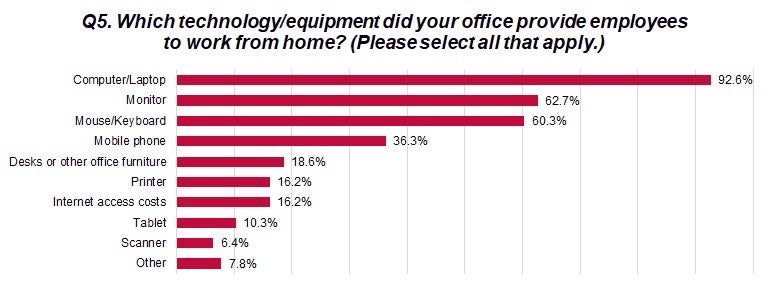
Other amenities are far less common. Thirty-six percent of participating ACC members received a mobile phone to assist with communication needs, and 18 percent were provided with office furniture, such as desks. Sixteen percent of in-house counsel surveyed received printers and are reimbursed for Internet access costs, ten percent reported receiving a tablet, and six percent, a scanner. Eight percent indicated receiving other types of assistance, most commonly a stipend to purchase additional technology and office equipment.
Additional survey questions focused on team collaboration and the technological tools used by in-house counsel to keep in touch and get work done while being physically apart. Seven in ten respondents reported that their legal department uses Teams, the only collaboration tool that is used by a majority of respondents. Other videoconferencing tools used are Zoom (43 percent), Skype (37 percent), and Webex (31 percent).
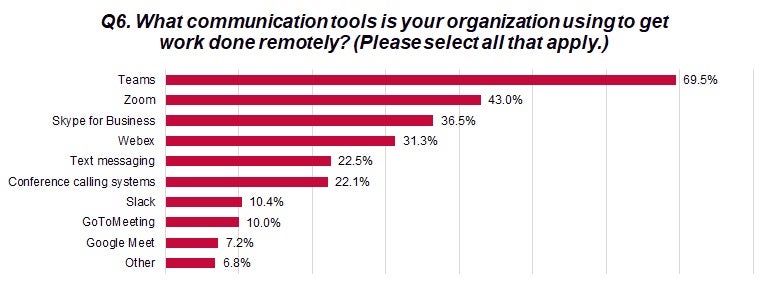
Twenty-three percent of in-house counsel participants indicated that they use text messages, and 22 percent use conventional conference calling systems. A small minority of ten percent uses Slack and GoToMeeting, and seven percent reported using Google Meet. Other, non-listed technological solutions, including BlueJeans, Jabber, and RingCentral, are used by seven percent of participants.
Unsurprisingly, 94 percent of ACC members surveyed admit that they have been using videoconferencing technology at work more often since the start of the COVID-19 pandemic. Eighty-one percent report that their use of videoconferencing tools has substantially increased, and 13 percent noted that the increase was moderate. A minority of six percent said that their videoconferencing use has not changed, and none of the survey participants reported using these tools less.
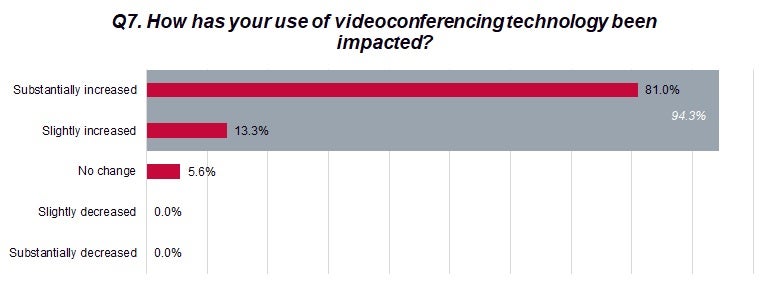
The widespread use of videoconferencing tools at work raises an interesting question about how quickly in-house counsel have adapted to this form of communication and whether they are comfortable with it. Seventy-one percent of ACC members surveyed claim to be very comfortable doing videocalls since the start of the pandemic, and an additional 23 percent indicate that they are somewhat comfortable.
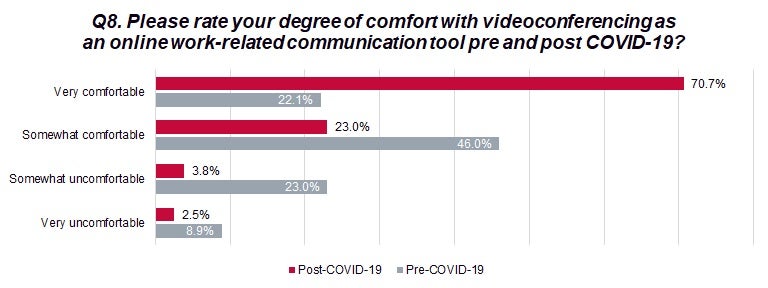
We also asked participants how they felt about videoconferencing before COVID-19 struck, and the results suggest that in-house counsel have adapted to this new form of routine communication easily. Thirty-two percent indicated that, pre-COVID-19, they felt uncomfortable using videoconferencing tools, but only six percent feel that way about it today. Consequently, while only 22 percent of in-house participants felt very comfortable with videocalls before, this number has more than trebled since teleworking has become the new norm.
Finally, in-house counsel provided tips and lessons learned from this period that may prove useful to make the most of online communications in the legal department. Below are the main five takeaways from participating ACC members:
- Remote work is here to stay. Even after it is reasonably safe to return to the office, in-house counsel will continue to telework thanks to the opportunities provided by online communication tools.
- The expansion of telework is likely to limit in-person meetings and business travel. Participants point out that videoconferencing is landing the same results with the benefit of saving time and travel-related costs.
- In-house counsel are more efficient while working from home, but they warn about putting in longer hours and increased fatigue. Having a comfortable home office space is key.
- Widespread telework can also weaken human relationships at work. Some in-house counsel recommend taking advantage of videoconferencing to keep in touch with the team with short, 15-minute “water cooler conversations” — ACC does regular “virtual coffees”! — to touch base with your colleagues and build camaraderie.
- To help better connect with your colleagues, in-house participants also recommend using videoconferencing rather than just telephone conference calls. However, some also advise to keep the meetings short to stay on focus.
These interesting results build on other relevant topics that this member flash poll series has covered. Additional resources to assist legal departments respond to the effects of COVID-19 are available in the ACC Resource Center.